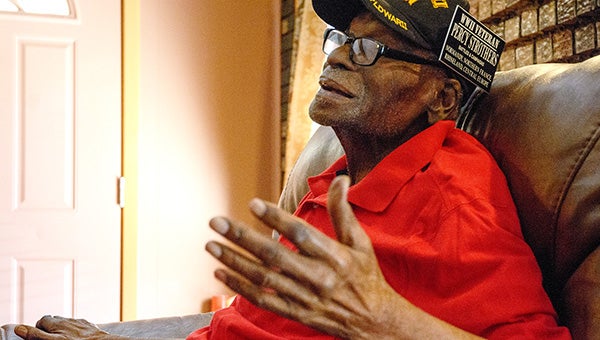Strothers recalls service, D-Day invasion
Published 10:39 am Tuesday, November 1, 2016

- WAR HERO: Vicksburg resident Percy Strothers, 91, talks about his experience in the European Theater during World War II. (Marlee Crawford/The Vicksburg Post)
By Lana Ferguson
The Vicksburg Post
Percy Strothers spent his 19th birthday on the beach. But there wasn’t a party. The beach was Normandy. This was D-Day.
Strothers, now 91, has trouble hearing but he still remembers the sound of tanks maneuvering and big guns firing all around him just 15 miles off Normandy’s coast. And he remembers coming home to a not-so-welcoming America.
After graduating from high school in April 1943, Strothers was two months shy of being old enough to enlist in the Army. He lied. He told recruiters he was 17 and it worked. Shortly after, Strothers was inducted into the army at Camp Shelby, south of Hattiesburg.
After basic training, he was sent to Camp Pickett, Virginia and then to Fort Juachuca, Arizona. When his unit left to go soverseas, Strothers was left behind.
He was reassigned to the 775th Military Police Battalion in Sioux City, Nebraska. It was supposed to be Strothers’ final stop, guarding an ammunition depot.
A couple of Strothers’ buddies in the unit got into trouble, which resulted in the entire unit being sent to the front lines in Europe.
“They packed us up and within three weeks we were on the Queen Elizabeth going to Europe,” Strothers said. “They said, ‘If they want to fight, then put them on the front line.’”
Strothers traveled to Camp Kilmer, New Jersey where he and 40,000 other soldiers boarded the Queen Elizabeth, one of many luxury ships converted to shuttles for soldiers. Because of a German submarine stalking the ship, they were forced to detour and the men were dropped off in Scotland. They boarded a train and were off to England.
In England, he was trained to guard prisoners of war including German SS troops.
Strothers’ memory isn’t what it used to be, but he does remember being on the front line hearing German fighter planes and German soldiers firing bullets at his unit’s trucks while traveling north through France after the Normandy landing. They were strafed by the fighters, sometimes leaping from the trucks to take cover.
He and his buddies wound up in St. Lo in Northern France, the Rhineland, and Germany. His unit hooked up with Gen. George Patton’s Third Army and also wound up at the Battle of the Bulge. He even stayed after the war to play a little amateur baseball.
He returned to the United States in January 1946.
He had just survived one of the most horrific wars in history, but to hear Strothers tell it, coming home was at least as bad.
When he and four other black men boarded a bus at Camp Shelby to go home, they were immediately banished to the back.
They were 60 or 70 miles out of camp when two highway patrolmen pulled the bus over and ordered the five black men to get off.
The patrolmen “called us by the N-word” and searched them, he said.
“We hadn’t done anything and they left us on the side of the road, sitting on our duffel bags, to get home the best way we could,” Strothers said. “We did all we could for our country and they left us sitting on the side of the road.”
It cost him $15 to get a ride home.
“I cried,” he said. “To think about how I sacrificed my life and they treated me like that. I thought things were going to be better.”
But hardship and discrimination didn’t stop Strothers from living a happy, full life.
“Ninety-one years is a long time,” Strothers laughed. “Thank God. Thank God. Thank God.”
Strothers has been married to his wife Carolyn for 50 years. They have two children, Eric and Karen, and two grandchildren.
In his home, everywhere you turn, there’s a family picture. There, a youthful Strothers smiles with Carolyn on their wedding day in 1966. Here, over the recliner, his two children join them, all dressed in red. Across the room is a framed copy of an old Vicksburg Post story on his war exploits. His favorites are the ones with all of the family in them, though.
“They’re a part of me,” Strothers said.
He became a familiar face around Vicksburg delivering mail in the area for 27 years before retiring.
Even now, Strothers wears his World War II veteran hat with pride. Despite the bullets and the bombs, despite the back of the bus, despite his battles with age, this country is still his home and he loves it.
SPECIAL SERIES: This story is part of a series of articles featuring local veterans and their stories. The stories were written by journalism students from the University of Mississippi and is sponsored by Trustmark Bank.





